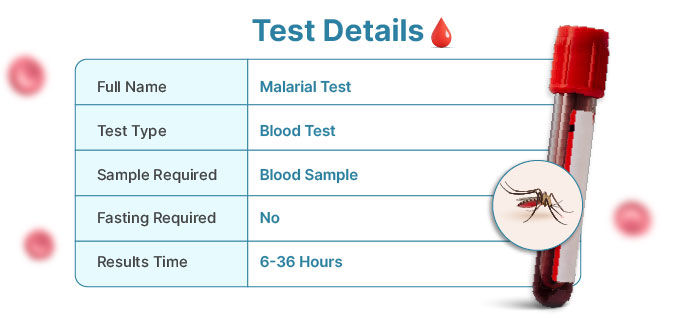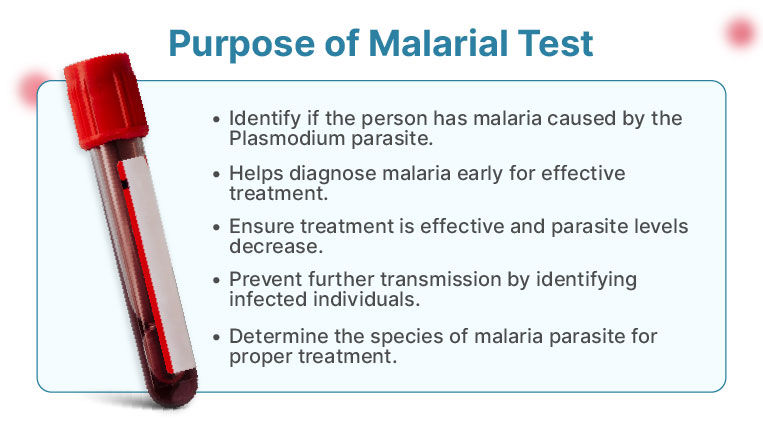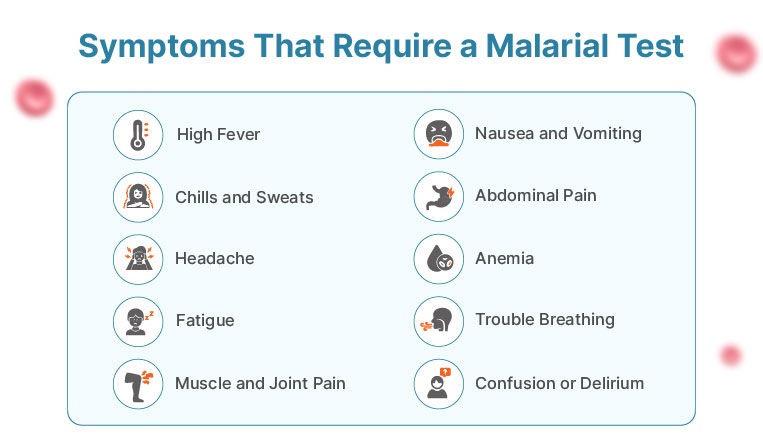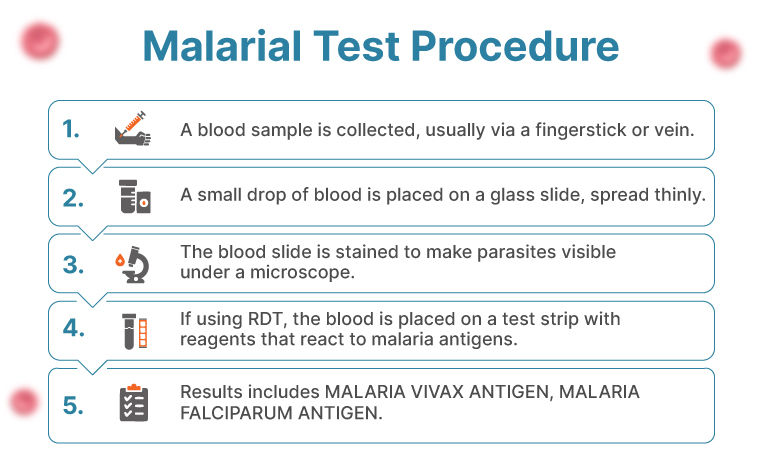Malarial Test
No preparation required
 Tests Included (2)
Tests Included (2)
- Malarial Test
2 tests included
About

BLOOD

Both

7 years & above
Malarial Antigen (Vivax and Falciparum) – Price, Purpose, Range & Reports
Test Overview
| Sample Type | Blood |
| Reports Delivery | Earliest reports available within 10 hours |
| Price/Cost | 959 |
| Number of Tests Included | 2 |

What is a Malarial Antigen Test?
Malaria remains a major health concern globally, caused by the Plasmodium parasite transmitted through the bites of infected female Anopheles mosquitoes. If left untreated, malaria can lead to life-threatening complications such as severe anaemia, cerebral malaria, kidney failure, or even death.
A malarial antigen test is a rapid and reliable diagnostic tool designed to detect malaria infection at an early stage. This test identifies specific antigens (proteins) produced by the two most common malaria parasites — Plasmodium vivax and Plasmodium falciparum. The presence of these antigens in your bloodstream confirms active infection, allowing prompt treatment and helping prevent severe complications.
Doctors recommend a malarial antigen test for individuals with flu-like symptoms, unexplained anaemia, or those who have travelled to or live in high-risk malaria zones. Early detection through a malarial antigen test supports timely treatment and reduces the risk of severe disease.
What is the Malarial Test Price?
The MP antigen test is usually affordable, but understanding the key factors that influence the malaria test price can help you better manage your healthcare expenditure. Here are the key factors affecting the MP antigen test price:
- Test Demand: The malaria test price is often influenced by its demand across cities. In major cities like Hyderabad, Bangalore, Gurgaon, Noida, and Chennai with a higher demand for the MP Ag test, you might notice slightly elevated test prices.
- Laboratory Quality: The quality of the laboratory conducting the malarial antigen test procedure also impacts the overall malaria test price. Laboratories with advanced technology and stringent quality control measures may charge higher prices. It's always wise to opt for a certified laboratory known for its accuracy and reliability when it comes to conducting a malarial antigen test procedure.
- Comprehensive Inclusions: The malarial test cost generally includes several components, such as laboratory fees, sample collection charges, and any related professional fees. Additionally, it may also provide information about the malarial antigen test normal range, giving you a comprehensive understanding of your test results. Knowing what these charges include ensures transparency and helps avoid unexpected expenses.
- Discounts and Promotions: Many healthcare facilities often give discounts or bundled packages for diagnostic tests like the MP Ag test. These offers can significantly reduce the overall malarial test cost.
Apollo 24|7 maintains competitive malaria test prices while ensuring exceptional service quality. Before undergoing the malarial antigen test, it's advisable to check the test prices across different cities.
What is the Purpose of a Malarial Antigen Test?

The malaria falciparum and vivax antigen test plays a significant role in diagnosing malaria effectively. The purpose of a malarial antigen test is multi-fold:
Early Detection: Detects malaria infection early for timely treatment, preventing severe complications and halting the spread of malaria in endemic areas.
Identifying The Strain: Distinguishes between Plasmodium vivax and Plasmodium falciparum. This differentiation is vital as each strain may necessitate specific treatment protocols.
Estimating Severity: Measuring specific antigen levels provides insights into the severity of the malaria infection. Elevated antigen levels may indicate a more severe form of the disease, prompting healthcare providers to consider hospitalisation or intensive management strategies.
Monitoring Treatment Response: Doctors may repeat the malarial antigen test during treatment to check whether antigens are clearing from the blood.
Differentiating from Other Febrile Illnesses: Helps rule out other diseases with similar symptoms, such as dengue or typhoid, ensuring you receive the right treatment.
Who Should Get a Malarial Antigen Test Done?
Knowing who should undergo a malarial antigen test procedure is crucial for managing the disease effectively and initiating treatment promptly. Here's a list of individuals who should consider undergoing the MP antigen test:
- People with flu-like symptoms (fever, chills, fatigue) that do not improve with routine care.
- Those living in or travelling to malaria-prone regions.
- Patients with unexplained anaemia that could suggest malaria.
- Individuals previously treated for malaria, to check for relapse.
- Patients not responding to anti-malarial treatment.
- People with weak immunity who are at higher risk of severe malaria complications.
Components of a Malarial Antigen Test

Understanding the components of the malaria test name is vital for diagnosing and effectively treating malaria. The malarial antigen test detects specific antigens produced by the malaria parasite. Given here are the key components included in the malaria antigen test list:
- MALARIA VIVAX ANTIGEN: The malaria antigen test for Plasmodium vivax detects the specific malaria vivax antigen in the bloodstream. This early detection is crucial for timely treatment, as P. vivax can cause recurrent infections and severe health complications.
- MALARIA FALCIPARUM ANTIGEN: The test targets the malaria falciparum antigen. Rapid detection of this antigen is vital due to P. falciparum's potential to cause severe and life-threatening malaria. Early and accurate identification allows for immediate and aggressive treatment, which is essential to prevent fatal outcomes and manage the infection effectively.
Understanding the Malarial Antigen Test Report
The malarial antigen test detects the presence of malarial antigens (proteins) formed by the malarial parasite. It determines whether different species of Plasmodium are present or absent in the individual undergoing the test. These tests are usually qualitative rather than quantitative, meaning they indicate whether the antigens are present or absent, rather than measuring the exact concentration of the antigens.
Note: The measures may vary with age and sex.
Malarial Antigen Test
Preparation and Procedure for Malarial Antigen Blood Test

Proper malarial antigen test preparation is necessary in order to ensure precise and accurate test outcomes essential for subsequent diagnosis and treatment.
A. How is Malarial Antigen Test Done?
- The MP antigen test is a simple and fast procedure where a blood sample is extracted from a vein in your arm.
- A doctor or trained healthcare professional will draw a small amount of blood from a vein in your arm using a fine needle. This blood sample is then collected in a vial or test tube for analysis. The collected blood sample will be sent to a laboratory where it will be evaluated.
- While you may feel a slight sting as the needle pierces your skin for a blood sample, the process is usually quick, typically lasting less than five minutes.
- Occasionally, you might notice some pain or bruising at the site where the needle was inserted, but these symptoms resolve quickly
B. Is Fasting Required for a Malarial Antigen Test?
Fasting is not required for a malarial antigen test. Unlike certain blood tests that require fasting to obtain accurate results (such as lipid profiles or glucose tests), the malarial antigen test primarily involves detecting specific antigens produced by the malaria parasite in the bloodstream. These antigens are independent of food intake and are not affected by fasting.
C. What Time of the Day Should I Undergo a Malarial Antigen Test?
Determining the optimal time of day for an MP antigen test can impact result accuracy. It is generally recommended to undergo the test as soon as symptoms appear or when there is suspicion of malaria infection.
The ideal time to get tested is during the fever spike, usually occurring in the late afternoon or early evening. This ensures that the antigens are present in higher numbers, increasing the likelihood of detection.
However, if symptoms persist and tests are negative, it is advisable to repeat the test at different times of the day to rule out chances of infection.
Booking a Malarial Antigen Test Online & Checking Reports
Online healthcare services offer unparalleled convenience, particularly beneficial for elderly individuals, pregnant women, and those with mobility constraints. This section outlines the simple steps to book a malarial antigen test online through Apollo 24|7 and the steps to access the test results once they become available.
A. What are the Steps to Schedule a Malarial Antigen Test on Apollo 24|7?
Booking your malarial antigen test near me procedure through Apollo 24|7 is simple and fast, offering a user-friendly experience from the comfort of your home. Follow these simple steps to schedule your test:
- Visit Apollo 24|7 Website or App: Begin by visiting the Apollo 24|7 website or downloading their mobile app. Both platforms are user-friendly and easy to navigate.
- Search for the Test: On the homepage, find the search box, usually located at the top. Enter "malarial test near me" to go directly to the test page.
Select Your Preferred Time and Location: On the test page, choose a suitable time slot and location for your test. Explore the "malarial test near me" feature to choose nearby options. - Complete Your Booking: After selecting your preferred time and location, enter the required information to complete your online booking for the MP Ag test.
- Wait for Confirmation: Finally, wait for a confirmation message from Apollo 24|7, indicating that your booking for the MP antigen test has been successfully processed.
B. How do I Access my Malarial Antigen Test Results Online on Apollo 24|7?
Once your blood sample has been collected and analysed, follow these steps to easily access, review, and download your malarial antigen test report through the Apollo 24|7 platform:
- Await Notification: You will receive a notification from Apollo 24|7 when your test results are ready for viewing.
- Access Your Account: Log in to your personal account on the Apollo 24|7 website or mobile app using your registered credentials.
- Navigate to the Reports Section: After successfully logging in, go to the dedicated 'Reports' section where all your medical test results are securely stored.
- Locate 'malarial antigen test': Find the specific entry corresponding to your malarial antigen test among the list of available reports.
- Download Your Report: Search for the option to download and store your test report. This feature allows you to retain a copy of your malarial antigen test report for future use or to share it with your doctor.
 Frequently Asked Questions (FAQs)
Frequently Asked Questions (FAQs)
If my malarial Antigen blood test results are positive, what are the next steps? Should I consult a specialist or make specific lifestyle changes?
If your malarial antigen test results are positive, it is crucial to consult a doctor immediately. Malaria is a serious disease that requires prompt medical attention. The doctor might prescribe you an antimalarial medication based on the type of malaria (malaria falciparum or vivax) detected in the antigen test. As for lifestyle changes, rest and hydration are the keys, but they can't substitute for proper medical treatment.
Are there any alternative or complementary tests to consider alongside a malarial antigen test for a more comprehensive assessment?
Yes, alongside a malarial antigen test, the doctor might recommend the mp (malaria parasite) smear test. This test helps identify the specific species of malaria parasite causing the infection. Other supplementary investigations like complete blood count (CBC), liver function tests (LFTs) and kidney function tests may be suggested to evaluate the overall health status.
Are there any emerging technologies or advancements in malarial antigen testing that I should be aware of?
Modern healthcare is continuously evolving, and so is diagnostic technology. There's ongoing research into developing more sensitive and rapid diagnostic tests beyond current malarial antigen tests such as the mp ag test. While these advancements hold promise, currently the combination of malarial antigen testing and microscopic examination remains the gold standard for diagnosing malaria.
Can I drink water before the malarial antigen test?
Yes, you can drink water before taking a malarial antigen test. It's a simple blood test that doesn't require fasting. However, it's best to stick to water only and avoid tea, coffee or other beverages unless advised otherwise by your doctor.
How long does my malarial antigen result stay positive?
The duration for which a malarial antigen result stays positive can vary. Generally, if you're undergoing treatment for malaria, your doctor may conduct subsequent tests to monitor the decline of antigens, ideally becoming negative as you recover. However, in some cases, the antigen may persist for several weeks even after successful treatment.
How accurate is malarial antigen for the diagnosis of malaria?
The accuracy of the malarial antigen test is high, particularly for P. falciparum malaria. However, these tests are more effective when used in combination with other diagnostic methods like microscopy to ensure accurate diagnosis and treatment.
When should I repeat a malarial antigen test?
Consider repeating a malaria test if symptoms persist despite an initial negative result, especially after recent travel to malaria-endemic areas. Repeat testing is also advisable if the first test is inconclusive or to monitor treatment effectiveness. Healthcare providers may recommend periodic testing for individuals at increased risk of malaria. Timely repeat testing ensures accurate diagnosis and appropriate management of malaria infections, crucial for preventing complications and ensuring effective treatment.
What are the diagnostic tests for malaria parasites?
Malaria is diagnosed using blood tests, like the Malarial Antigen Test, which detects Plasmodium Vivax and Falciparum antigens, and Peripheral Blood Smear, which identifies malaria parasites under a microscope. Additional tests, like Polymerase Chain Reaction (PCR) and Rapid Diagnostic Tests (RDTs), may also be used for detection.
How much does a malarial test cost?
The cost of a malaria parasite test typically ranges from ₹ 1013 to ₹ 1088, depending on the diagnostic center, test method, and location. Prices may vary if home sample collection or advanced testing methods are included.
Who should get a malaria parasite test?
Individuals experiencing symptoms like fever, chills, sweating, headache, nausea, and muscle pain, especially after traveling to malaria-endemic areas, should get tested. It is also recommended for those with unexplained fever or suspected mosquito-borne infections.
What are some limitations of malaria parasite tests?
Some tests may not detect low levels of parasites, leading to false-negative results. Delayed testing after initial symptoms may also reduce accuracy, and rapid tests may be less sensitive compared to blood smear or PCR methods.
Can I take a malaria parasite test at home?
Yes, Apollo 24|7 offers home sample collection for the Malarial Antigen Test (Vivax & Falciparum). A trained professional will visit your home to collect the blood sample, which will then be sent to the lab for analysis, ensuring accurate and reliable results.
Can malaria parasites be detected in urine or saliva samples?
No, malaria is primarily diagnosed using blood tests, as the parasites reside in red blood cells. Urine or saliva tests are not reliable for detecting malaria infections.
General Physician/Internal Medicine
Book Popular Tests at Home
Hba1c (glycated Hemoglobin) | Cholesterol - Serum | Complete Urine Examination (cue) | Glucose, Fasting | Glucose, Random | Creatinine - Serum | C-reactive Protein (crp) - Quantitative | Culture And Sensitivity - Urine (automated) | Prothrombin Time (pt/inr) | Erythrocyte Sedimentation Rate (esr) | Beta Hcg (total) | Uric Acid - Serum | Electrolytes - Serum | Urea And Creatinine | Blood Group Abo And Rh Factor | Ferritin | Vitamin B12 | Hbsag Screening - Rapid | ProlactinBook Malarial Test Test in Other Cities
Malarial Test in Delhi | Malarial Test in Noida | Malarial Test in Faridabad | Malarial Test in Gurugram | Malarial Test in Ghaziabad | Malarial Test in Hyderabad | Malarial Test in Bangalore | Malarial Test in Kolkata | Malarial Test in Chennai | Malarial Test in Mumbai | Malarial Test in Ahmedabad | Malarial Test in Pune | Malarial Test in Lucknow | Malarial Test in Vizag | Malarial Test in VijayawadaBook Popular Packages with Apollo
Apollo Prime Health Plan | Apollo Thyroid Assessment - Basic | Apollo Vitamin Check - Basic | Apollo Diabetes Panel - Basic | Apollo Full Body Check - Advance IWhy should Apollo be your preferred healthcare partner?
- 40 Years of legacy and credibility in the healthcare industry.
- NABL certified multi-channel digital healthcare platform.
- Affordable diagnostic solutions with timely and accurate test results.
- Up to 60% discount on Doorstep Diagnostic Tests, Home Sample Collection.
- An inventory of over 100+ laboratories, spread across the country, operating out of 120+ cities with 1200+ collection centers, serving over 1800+ pin codes.
The information mentioned above is meant for educational purposes only and should not be taken as a substitute to your Physician’s advice. It is highly recommended that the customer consults with a qualified healthcare professional to interpret test results


